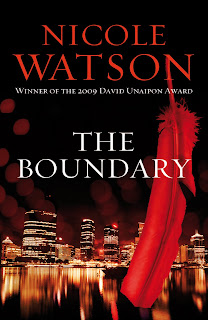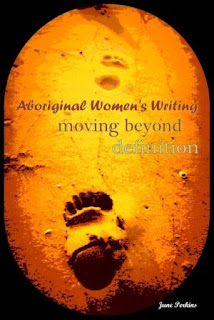The sacrifice and struggles of generations of Indigenous activist have helped to create a growing community of Indigenous writers, including many talented women. But are these women achieving the recognition they, and their communities, deserve?
In January, an unpublished Indigenous writer from Katoomba, NSW, helped to launch the Australian Women Writers 2012 Challenge. On Australia Day the AWW blog celebrated by publishing an essay by Dr June Perkins on Indigenous Australian women's writing. Now that the challenge has reached the halfway point, it's a good time to assess whether it is helping to raise the profile of Indigenous Australian women writers.
This week, I went back over all the reviews that have been posted for the challenge and added a label of the genre to the Mr Linky box entries. I hesitated when I came across a book by an Indigenous author. Should I put "Indig" next to the link? Or would such labelling ghettoise these writers, when the strength of their writing and the interest generated by their chosen subject should be enough to attract attention? (It's the same question I faced when mounting a challenge dedicated to championing women writers.) Also, what if I missed a particular author who may identify as Indigenous but whose background is not known to me or made obvious in the review?
In the end, I didn't add the extra label: the 80-character limit for Mr Linky entries decided the issue. Instead, as a contribution to Indigenous Literature Week, I've listed below as many links to reviews of books by Indigenous writers that I recognised. (If I've missed any, please let me know and I'll add them.) From this list, we can judge how the challenge has fared so far in addressing the issue of recognising and promoting work by Indigenous women.
The result?
Books by Indigenous women reviewed for AWW challenge Jan-Jun, 2012 (alphabetical):
- Bandler, Faith. Welou, My Brother Reviwed by John Nebauer*
- Heiss, Anita. Avoiding Mr Right. Reviewed by Cathy Powell
- Heiss, Anita. Manhattan Dreaming. Reviewed by Suburban Sonnet, Christine
- Huggins, Rita and Jack Huggins, Aunty Rita. Reviewed by M D Brady
- Kartinyeri, Doris. Kick the Tin. Reviewed by M D Brady
- Kennedy, Gayle. Me, Antman and Fleabag. (Short Stories) Reviewed by Jenny Schwarz*
- Morgan, Sally. My Place. Reviewed by M D Brady, Michelle
- Pilkington, Doris. Rabbit Proof Fence. Reviewed by Ann-Marie
- Wright, Alexis. Carpentaria. Reviewed by: Kate Rizetti, M D Brady, Tony's Reading List, Jo Tamar
- Wright, Alexis. Plains of Promise Reviewed by M D Brady
* Inadvertently left off original post.
Collected:Southerly 71:2 (Literary Journal) Reviewed by Phillip A. Ellis: Special issue for Indigenous Writers
Why so few reviews of books by Indigenous women?
In her Australia Day post, Dr June Perkins discussed a number of prominent Indigenous Australian women writers (read more here). At the end of Dr Perkins' essay was a list of Dr Anita Heiss selected "top 10" reads. They were:
- Butterfly Song by Terri Janke (2005) ~ Young Adult
- Bitin’ Back by Vivienne Cleven (2001) ~ Contemporary/Humour
- Too Flash by Melissa Lucashenko (2002)
- Carpentaria by Alexis Wright ~ Literary
- Swallow The Air by Tara June Winch (2006)
- Every Secret Thing by Marie Munkara (2009) ~ Contemporary
- Purple Threads by Jeanine Leane (2011) ~ Short Stories
- Watershed by Fabienne Bayet-Charlton (2005)
- Legacy by Larissa Behrendt (2009) ~ Contemporary
- The Boundary by Nicole Watson (2011) ~ Crime
What about the others?
One possibility for the lack of reviews is the date of release. At a cursory glance, many of the books reviewed for the challenge appear to be new releases, reviewed by established book bloggers. (This, incidentally, begs the question as to whether these books would have been reviewed in any case, with or without the challenge, but that's for another day.) Perhaps there has been a scarcity of books published by Indigenous women this year? Participants in the challenge might already have reviewed some of the above books in previous years (e.g. Whispering Gums' March 2011 review of Marie Mukara's Every Secret Thing and review of Carpentaria). Without further research along these lines, it's difficult to say.
Another possibility is that the preference for popular or "genre" books exhibited by challenge participants - something the list of "genre" alongside the books reviewed has helped to identify - may be working against Indigenous authors. There could be a perception that Indigenous women writers, apart from Dr Heiss, don't write "popular"-style books. If so, is this perception justified? At least a couple of books challenge such a view. As an avid reader of crime, I've long been looking forward to reading Nicole Watson's The Boundary, which I've heard is a great read. (If the library queue doesn't shorten soon, I might have to buy myself a copy.) So why has Watson's book not received the attention of other 2011 releases such as, say, debut author PM Newton's The Old School (reviewed five times) or Sulari Gentill's A Few Right Thinking Men (twice) or any number of novels by Kerry Greenwood (eleven reviews)?
Could we be letting our Indigenous women writers down? If so, there's time to rectify the matter. The challenge has another six months to run.
If you do decide to read an Indigenous author and the above books don't appeal, check out Anita Heiss's 100 Black Books Challenge, or Yvonne Perkins' compilation of Indigenous Australian Histories and Biographies for inspiration.
Let's add another dimension to the challenge and see whether, by the end of 2012, all the books above have at least one review.
Readers' recommendations:
Don't Take Your Love to Town - Ruby Langford Ginibi (Memoir)
Interrogation of Ashala Wolf - Ambelin Kwaymullina (Book 1 of SF/Psych Thriller series)
Is that You, Ruthie? - Ruth Hegarty (Memoir)
Am I Black Enough For You? - Anita Heiss (Memoir)
Black Chicks Talking - Leah Purcell (reviewed by Heidi Reads)
Grace Beside Me - Sue McPherson (reviewed by Emma) Debut YA novel
Other finds:
An Aboriginal Mother Tells of the Old (Penguin 1984) - Elsie Roughsey; edited by Paul Memmott and Robyn Horsman
More reviews:
Every Secret Thing - Marie Munkara (Heidi Reads)
Bitin' Back - Vivienne Cleven (Heidi Reads)
Skin Painting - Elizabeth Hodgson (Heidi Reads) ~ "Poetry as memoir"
Swallow the Air - Tara June Winch (Heidi Reads)
Love Poems and other Revolutionary Actions - Bobbi (Roberta) Sykes (Heidi Reads)
My Bundjalung People by Ruby Langford Ginibi (reviewed by M D Brady)
Other authors:
Fiona Doyle
If you're a GoodReads user, you can find a list of the above books on a special GoodReads AWW challenge group page (care of Shelleyrae of Book'd Out blog).







